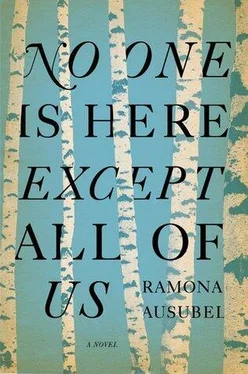A Son
Winning the bet
Next to each of these was a series of notches, one for each time one of us asked for the thing. Money had two rows of lines. We prayed for the health of ourselves more often than the health of our spouses but less often than the health of our parents. Sex was less requested, probably because we were shy, but almost all of us wanted to win the bet. The final category, the one that made us feel terrible, was this: A prayer that what happened to the stranger does not happen to me. Even with the safety of Creation between us and that story, many of us, dozens, had sat down on that old wooden chair and wished out loud that our stranger’s stolen life, her lost children, her mutilated mother remain only hers. That she alone sit out in the falling sky and record our hopeful lives for us.
The jeweler told us what he had seen. He made the rounds from house to house to say that we were leaving our stranger outside in bad weather under a cowskin and telling her how grateful we were to be better off than she was. He told everyone he insisted she sleep in the house from now on. “Also, peace is not even on the list,” he said. “Not one of us has prayed for peace.”
“Yes, but it’s only temporary. We’re building her a palace. We’re praying for peace when we pray for all the other things. We want money because we want peace, right?” the banker tried nervously to reason, while he popped a nut out of its shell and licked the crystals of salt from his fingers. The banker was leaning against his doorframe, each polished button on his vest reflecting the jeweler’s face back at him, distorted and clownish.
“I think we could stand to pray for what we really want, then. But in the meantime, we haven’t built the palace yet and our stranger is freezing.”
“Many nights we invite her into our homes and rub her feet. Has she forgotten?” The banker tossed his shells into a puddle, where most sank but one floated — a boat big enough to save nothing.
“We are already so used to having a miracle with us that now she’s soaking wet and we don’t care to dry her off.”
Shame was a feeling that arrived all at once. The villagers had gotten away with everything so far. The stranger was like a communal pet and everyone figured she was lucky to have been adopted by us, to have the square, safe and clean, to live in. Now that our selfishness had been pointed out, we figured we did not deserve even one good thing on the earth.
So the village agreed to take another vote. Most of us did not want to turn our own house into the temple, even temporarily, even when the idea was floated that it must be a very godly thing to do. Where would we say the thing that was too private, too quiet a desire to bring even to the ears of God?
“I would do it,” the jeweler said, trying to sound as if he had only thought of this now. As if he had not racked his brain for a way to come home to the stranger each evening.
“Nah,” the old men agreed. “Too small. Too full of junk.” The jeweler bit his cheek.
“I could add a room,” he tried.
“It’s not really fair, anyway. What if you get closer to God than the rest of us? We don’t want any special privileges,” the banker said.
The jeweler was jittering. So taken had he been with the image he had sprung of the stranger in the low light of every evening for the rest of their lives, seated at the window with a book on her lap.
“What about the barn?” the butcher asked. “I’m sure the animals wouldn’t mind.”
“You’d choose the barn over my house?” the jeweler mumbled, his forehead turning red with shame.
The barn did not smell like a house of God, it smelled like the house of goats — their buttery oil and their stamping hooves and interested mouths. The horses swished their tails and looked at us with eyes that seemed to be melting. The chickens tucked themselves into their nests or walked nervously around.
“Welcome to the holy temple,” we joked, kicking shit and hay. Our stranger dried off with some rags we had brought and sat down against the wall. “Thank you,” she said. “This is better.”
The jeweler got to work making the stranger’s bed and setting up a pile of carefully folded shirts from his own closet for her to wear. He thought ahead to the day he would come to switch them out — clean for dirty — only his plan was not to wash the ones she had worn, but to ball them up and sleep on them.
The rest of us took stock of the big room. At the far end, the animals had their quarters: shelves for the dozen chickens, a pen for two horses. The four goats walked freely around. Heavy-coated sheep were left outside, their oily wool beaded with rainwater. We smelled them when the wind shifted. Small windows, probably never washed, ringed the walls. Floorboards creaked with every step, and the high ceiling was festooned with ribbons of dust, like a celebration planned by ghosts and spiders. My first parents and I found reasons to silently brush up against each other, and when we did our skin felt lit up. I was still supposed to be a baby, and could not tell them about the family-shaped hole in my chest.
The greengrocer and the weaver moved the crumbling piano into the barn from the healer’s house, where it had sat since we had dragged it up from the river, its chest full of the other washed-up things. The piano smiled on. The weaver pinned the map of the summer sky to the wall above it. We had a temple. We were happy, in spite of the lack of ebony, of leather, of soaring arches.
Igor apologized for keeping our stranger out in the rain. My mother — Perl, I told myself to call her, the name she was given by her mother, the name she was called by everyone except her children, which I no longer was — apologized to the stranger for telling her we were glad not to have suffered as she had.
“I’m glad you didn’t suffer that way, too,” our stranger told her. “But thank you for saying sorry.”
The animals chewed and shuffled, nosed at the hay. It seemed we were already moving too quickly. We were at the beginning of time just days ago and already we were apologizing. We thought it would be years before we would have had to start saying sorry. Perl and I knew the truth before the rest, that if hope was the first feeling, regret was the second or third.
“Can I say a prayer, and will someone else record it?” the stranger asked. Perl took out her notebook. “I pray that I am empty enough to hold you all,” the stranger said.
“You are,” Moishe said. “Enough, I mean. You have to be. You are the reason we believe.” It was exactly what I would have said if I could speak.
“I will try. I pray.” Perl scribbled it all down and ripped the page out. She folded it carefully up and handed it over, like a secret we knew but wanted to keep anyway.
“I wonder how many terrible things we do to each other every day?” the healer asked. Hersh looked at me, apologizing with every part of his face. Kayla’s eyes were clear, regretless.
“For one,” the chicken farmer said, “people sneak in and steal the eggs.”
“Children leave their toys out for me to trip on,” the baker’s mother said.
“I wish that people would remember my name,” added the man whose name no one could remember, even now.
“No one ever comes to check on me,” whispered an old woman who was no one’s grandmother or mother or friend. “No one knows if I’m even alive.”
The old man with only one eye asked if we could start over yet again and this time do it really, really right. Much better than the first — or second, someone corrected — time. Everyone else agreed that we could not. The butcher thought we could try to grow up more slowly, more carefully, and the baker promised to check on the old woman every Saturday, at least. The children said they would stop stealing the eggs, which they admitted were never eaten, only crushed for the joy of it in their pink hands. Most of us said we were sorry, except the ones who insisted they had done nothing wrong. The rest of us said sorry on their behalf, which made them angry, so we said sorry to them, too. I made my apologies silently.
Читать дальше












